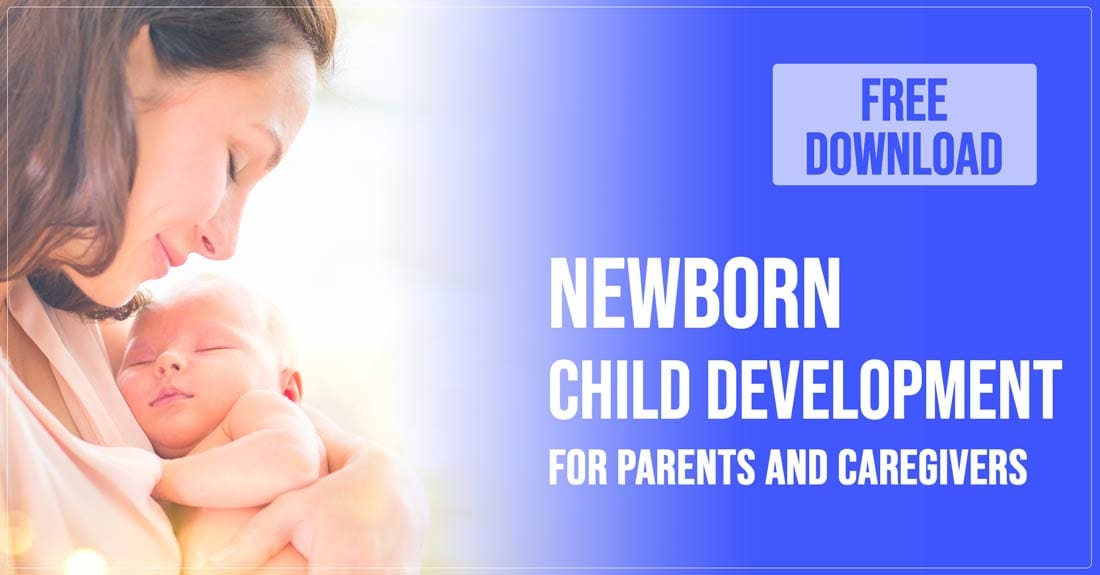Newborn Development – Your 1-Week Old Baby
After nine long months of excitedly awaiting the arrival of your new baby, your child is finally here! This moment is one of the happiest of your life, yet it is also perfectly normal to be somewhat nervous, especially if it is your first baby.
New babies go through a massive transition from spending nine months in the womb to being outside for the first time. Because of this, your child will go through many newborn development stages within just the first few weeks.
NEWBORN DEVELOPMENT | FREE DOWNLOAD
As infants are entirely dependent on their caregivers to take care of them, it is understandable for new parents to be extra cautious when caring for the baby. New parents often feel somewhat anxious about what they should expect when it comes to their child’s development. This could be challenging for parents’ mental health. To help ease concerns and prevent mental health issues, all parents need to be fully aware of expected changes and what should raise concerns.
Read on to learn about typical baby goals that newborns reach within the first few weeks.
Your Baby’s Development
Newborn babies’ growth and development happen rapidly as they constantly adapt to their new environment. So make sure to enjoy your new roles caring for your baby, learn all you can about your baby’s development, and be patient.
While it is essential to be aware of the expected baby milestones, it is also important to note that every infant goes through the baby development stages at their own rate. So don’t freak out over your child’s health right away if they do not hit certain milestones immediately.
Newborn Developmental Milestones
Sense of Smell
Once children are born, they can finally interact with their surroundings. As they start to get used to their surroundings, they become more aware of everything around them. With more awareness, most babies begin to react to different stimuli. For instance, babies start to develop a sense of smell. They may even give you the cutest little spontaneous smile after passing gas.
Hearing Ability
A critical part of newborn development is getting used to noises and differentiating sounds. For example, newborns can turn their heads towards sounds that they hear and even distinguish their parents’ voices from other sounds.
They may even start making sounds in response to your voice, which indicates that they are happy. Children are also more relaxed when they hear their parents’ calming voices.

Vision
There is no need to be alarmed if you notice that your baby cannot see too far away. Newborns are slowly adjusting their vision to the new world they have just been born into. However, a baby’s eyes are still relatively weak. Their eye muscles are not yet developed, and they cannot focus their vision.
A newborn baby can only see roughly 8-10 inches away. So when you breastfeed or bottle-feed your newborn, they should be able to focus on your face.
Motor Skills
Newborns have very little control over their movements. As a result, baby’s movements are minimal when they are newborns. Babies of similar ages all have a weak upper body. They cannot lift their heads without it being supported or even turning over independently. Their head is very heavy compared to the rest of the body, and they aren’t very strong yet!
Parents and family members need to remember to hold young children carefully since they do not have much strength. Their arms and legs tend to wave around sporadically, and they squirm around when they are held. Newborns will also start to refine their head control. For example, they will momentarily raise their head while lying down on their stomach.
Reflexes
Reflexes are important developmental milestones. All babies should have natural reflexes when they are born. They should be able to swallow, suck, sneeze, cough, gag, cry, yawn, blink, and complete all innate motions. Your newborn will also complete reflexes that help them survive, such as sucking on whatever is placed near their mouths as if they were breastfeeding.
Another reflex is that they should be able to grasp onto items put in their hands. When your newborn hears loud sounds, they may also have a startle reflex and feel as though they are falling. The baby will suddenly extend their arms and legs and arch their back. The babies reach out for safety. These reflexes are all part of a baby’s healthy development.
Baby’s Growth
A typical birth weight for babies is around 5-8lbs. They are also usually between 19 to 21 inches long. It is completely normal if your newborn actually loses weight a few days after they were brought home from the hospital. This is because newborns have an inflated birth weight because they are born with extra fluid in their bodies, so that they may lose some weight as the fluid leaves their bodies.
It is common for newborns to lose up to 10% of their weight after birth. It may take longer for a baby that drinks breast milk than a baby who drinks formula to gain weight. Nevertheless, breastfeeding and formula feeding are equally beneficial to infant development and health.
Newborn Needs
Baby Feeding
Breastfeeding and formula feeding are both excellent options for your baby’s health. Whether you chose to breastfeed, formula feed, or a combination of the two, you have options. No matter what you feed, newborns need to be fed very often to get all of the nutrients necessary to get through the newborn development stages.
Some breastfed babies have difficulty latching on to the nipple at first. So it is best for the mother to support the baby’s head and make sure the nipple is aligned with the baby’s nose. When breastfeeding, your baby may make eye contact with you. It is very helpful to receive breastfeeding support in the first week. A lactation consultant can help ensure the baby has the most efficient latch and can teach you strategies to make the experience the best it can be.
Parents should feed their baby at least every 3 hours, even throughout the night. A baby should be fed around 8 to 12 times a day, even if it means the baby needs to be woken up to be fed. As they get older, they will be able to go more extended periods without feeding. Good nutrition is an essential part of infant development.
Baby Sleep
The phrase’ sleep like a baby’ is undoubtedly true for many newborns. It is perfectly normal for a baby to be incredibly sleepy within the first few days after birth since they need to recuperate their energy.
A newborn sleeps most of the day. A baby can sleep for around 17 to 20 hours a day. Out of the few hours they are awake; they should cry anywhere from 1 to 4 hours and be alert and relaxed for around 2 to 3 hours of the day. The amount of sleep your baby needs can also vary between each baby.
FAQs – Frequently Asked Questions
How can you help newborn development?
The best way to help your child reach all of their newborn goals is to spend lots of time with them. It is best to talk normally, sing songs, and read stories to your child. That way, they can get used to listening to your voice and prepare for language development. By being surrounded by family, babies will. As parents, you should make sure they grow and develop in a nurturing, family environment with love, comfort, and stimulation. Always provide a safe place for your baby to have the best health possible.
What is Sudden Infant Death Syndrome?
Sudden Infant Death Syndrome or SIDS is when a newborn baby suddenly dies without warning in their sleep. We are not sure why some babies die from SIDS. Some risk factors include sleeping on the abdomen and parental smoking.
What are some development concerns about your baby’s brain development?
Pregnant individuals should eat the proper nutrition during pregnancy to avoid development concerns. The National Institute of Child Health and Human Development says that most children whose mothers sought prenatal care and nutrition were healthier and had better brain development. For instance, taking folic acid during pregnancy prevents neural tube defects.
What is the fine hair covering my baby’s body?
Most babies are born with just hair on their heads, but some are born with fine hair covering their entire bodies. This hair is called lanugo and is common in newborns, particularly those born prematurely, which means they end up being born before the baby’s due date. Lanugo is entirely normal and should go away within a week after the baby has been delivered. It has no effect on a baby’s life or health.
What are common signs of jaundice in newborns?
Common signs of jaundice include yellow skin and the whites of the eyes turning yellow. Jaundice often occurs when the baby is 2 or 3 days old. The symptoms should go away within a week, but make sure to keep a close eye on your newborn. It is best to consult a doctor if you have any concerns.
When should I call a doctor?
Developmental milestones happen at a newborn’s own pace all of the time. But it is always best to trust your gut when it comes to a parent’s instinct about their child. That way, you can heed the warning signs and act early if your baby is in trouble. Make sure to call health professionals right away if your newborn child has any developmental red flags or medical concerns such as:
- Does not respond quickly to sounds.
- Has yellow-colored skin.
- Is refusing to feed or having problems latching onto the nipple.
- Has a rash.
- Constantly crying, or crying for longer periods of time.
- Shows signs of being sick (fever, cough, runny nose).
















